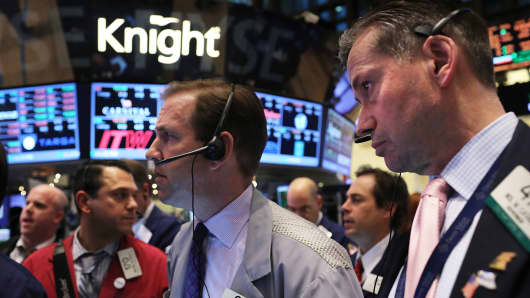We are now in the heart of earnings season, and something interesting is happening: Individual stocks are moving on earnings without dramatically affecting their sectors.
Look at industrials: General Electric and Parker Hannifin reported good numbers and are trading up. Johnson Controls offered disappointing guidance for the current quarter and is trading down. Most of the other big global industrial names (Dover, UTX, 3M, etc.) are, as you might expect, up fractionally.
In tech, it would not have been surprising to see the entire semiconductor space down on Intel's disappointing guidance. Intel is indeed down nearly 7 percent, but other large semis (Texas Instruments, Taiwan Semi, Micron, etc.) are simply fractionally up or down.
My colleague Jeff Cox wrote an interesting piece today on rotation out of banks and into industrials. This trade has indeed been happening. Industrials are slightly outperforming financials this month.
And you can make a good argument for it. China showing clear signs of bottoming, Japan in hyper-stimulus mode, Europe at least muddling through, and the U.S. slowly improving all would argue for a stronger environment for cyclical stocks like industrials.
Of course financials would benefit from an improving economy as well — to a certain extent they already have because low interest rates have improved mortgage lending — but those low rates have also hurt margins for banks.
Here's the problem I have with the "out of financials, into industrials" trade: Bank stocks were deeply undervalued last year, so buying them made a lot of sense. The problem is industrials were never deeply undervalued, and many (most) are near new highs, so it is much tougher to argue that the trade makes sense on a valuation basis.
Elsewhere
If stocks are worried about the debt ceiling, they have an odd way of showing it. Word that the GOP-controlled House will hold a vote next week to raise the debt ceiling for three more months barely moved the dial when it was announced, though the major indices did steadily move up into the close. Still, the move from high to low was all of 60 points, about half the normal range of the Dow. There was a modest pickup in volume in the SPDR S&P 500 ETF.
But raising the debt ceiling for even three lousy months would be big news for the Volatility Index (VIX) — which promptly dropped from roughly 13 to 12.4, a huge drop and another 5.5 year low. Remember, the VIX only tracks implied volatility expectations 30 days out. But even VIX futures farther out dropped. March VIX futures dropped as well. In fact, they dropped all the way out to July.










